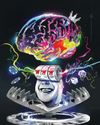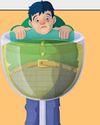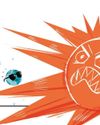
In the context of mental health, a phobia is far more serious than a mild aversion.
Many of us dislike flying, or giving a talk in front of our colleagues, and we might not be too happy if a large, slobbery dog, no matter how gentle, came bounding toward us. But as long as we can tolerate these kinds of situations without too much distress, and our lives aren't adversely affected, then we haven't got a phobia for any of these situations as such.
In contrast, people diagnosed with a relevant phobia would experience an intense, extremely unpleasant fear reaction that could be overwhelming. So much so, that it might interfere with their day-to-day lives. Flying phobias, social phobias, and a fear of dogs (even cute ones) are common examples - but there are dozens of others, including some quite bizarre examples, such as trypophobia, which is a fear of clusters of holes (like you get in crumpets), sedatephobia (a fear of silence) and gerascophobia (a fear of ageing).
ARE PHOBIAS A DISORDER?
Phobias are a formal psychiatric diagnosis in the anxiety category. To be diagnosed, you'd need to have experienced a phobia for at least six months, and your fear reactions to the focus of your phobia would need to be out of proportion to the danger you were in.
Psychiatry recognises five main categories of 'specific phobia' (between 3 to 15 per cent of people will develop one of these at some point in their lives): animal phobias (spiders and snakes are common examples); environmental phobias (such as heights or deep water); blood/injection phobias (think needles or the mere sight of blood); situational phobias (such as bridges or dentists); and finally an 'other' category that covers almost everything else, such as a fear of swallowing or being sick.
Diese Geschichte stammt aus der April 2023-Ausgabe von BBC Science Focus.
Starten Sie Ihre 7-tägige kostenlose Testversion von Magzter GOLD, um auf Tausende kuratierte Premium-Storys sowie über 8.000 Zeitschriften und Zeitungen zuzugreifen.
Bereits Abonnent ? Anmelden
Diese Geschichte stammt aus der April 2023-Ausgabe von BBC Science Focus.
Starten Sie Ihre 7-tägige kostenlose Testversion von Magzter GOLD, um auf Tausende kuratierte Premium-Storys sowie über 8.000 Zeitschriften und Zeitungen zuzugreifen.
Bereits Abonnent? Anmelden

NOW YOU SEE ME, NOW YOU DON'T
Scientists around the world are working on ways to hide us from sight. But how close are we to developing tech that could make us invisible?

UNCORKED POTENTIAL
How much good can ditching drink for a month really do? Answer: a whole lot. In fact, science shows even short-term abstinence could unlock a cocktail of lasting benefits

Scientists discover when humans and dogs became friends
The relationship spans thousands of years, but experts might have pinpointed the first connection

Why it's so hard to kick a gambling addiction
We now know that gambling can be as addictive as drugs, but there are factors that can make it even harder to quit

How much could Ozempic change our world?
The weight-loss drug has made headlines and broken sales records, but what does it mean for our future?

WHY DOES DRINKING ALCOHOL MAKE IT SO MUCH HARDER TO LOSE WEIGHT?
While enjoying the occasional glass of wine or pint of beer may seem harmless, regular or excessive alcohol consumption can significantly hinder your weight-loss journey for a few reasons:

Why do so many New Year's resolutions fail?
Establishing positive new habits is hard at any time of year. But there are ways to stop your attempts ending in failure

'Extreme' solar radiation storm could hit Earth
Sun-like stars may have tantrums far more frequently than we thought

HOW CAN I BANISH THE JANUARY BLUES?
Dark mornings, long chilly evenings and short days; many people find January tough.

Neutrinos are getting in the way of dark matter detection
These troublesome particles are difficult to detect, but they're starting to show up in places where they're not wanted